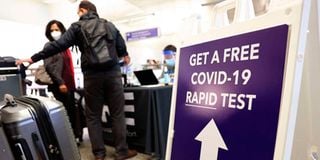Covid-19: Scientists call for further investigations on Omicron variant

People who arrived on international flights wait to be tested on the first day of a new rapid Covid-19 testing site for arriving international passengers at Los Angeles International Airport (LAX) on December 3, 2021 in Los Angeles, California.
Scientists across the African continent are reluctant to speculate on Omicron’s attributes even as South Africa begins to register an increase in cases and hospital admissions.
Although the new coronavirus variant known as Omicron, has alarmed scientists because of the sheer number of genetic mutations it carries — about 50 in all, including 26-32 that are unique to it—, many including the World Health Organisation (WHO) have called on the world to wait for results of further investigations before it is known what the variant can or cannot do.
This is even as Kenya Medical Research Institute (Kemri) begins conducting genome sequencing and re-investigating samples collected in November (when the first cases of Omicron were detected in South Africa) from people with recent travel history to rule out whether Omicron is circulating in the country.
Dr Evans Amukoye, a respiratory diseases expert and Kemri’s director of research and development said that the research institute has not yet detected the variant in Kenya. However, the research by Kemri may hit a snag due to the shortage of biological samples needed to run definitive tests in the country due to low testing and the use of antigen tests that he explains hampers the collection of samples.
“Usually, with PCR testing, there are bits of samples that remain which we use for sequencing. Right now there isn’t much testing going on so getting these samples is a bit hard,” Dr Amukoye said in an interview with Nation.Africa
Threat
Scientists across the world continue to understand the threat posed by Omicron, and see whether or not tests, vaccines, and treatments need to be adapted. Despite the many unknowns surrounding the variant, many are confident that the variant might not be as lethal as perceived.
The WHO has said that some of the mutations are concerning and may be associated with the potential of escaping immunity and higher transmissibility. However, there are still considerable uncertainties.
Although “no Omicron-related deaths have been reported,” WHO fears “serious consequences” in some areas of the world. Despite uncertainties about its transmissibility, preliminary data suggest an “increased risk of reinfection” with this variant.
The global health body: “Cases of the new coronavirus are expected in vaccinated people, although in a small and predictable proportion.”
Dr Amukoye argued that Omicron has been handled with a lot of emotions due to the news that it carries a lot of mutations on the spike protein, the part which the virus uses to invade the body.
“People are scared that it potentially might be more transmissible and maybe escape some of the immunity from vaccines and previous infections. The overriding word here is scared because those speculations are yet to be confirmed,” he said, adding that people should take personal responsibility and be more cautious than before.
Escapes immunity
“Vaccines still protect against other variants even though we do not know if Omicron escapes immunity.”
But more mutation does not necessarily mean a worse outcome of the virus. In fact, for some experts, the global response towards Omicron has largely been kneejerk reactions and hype other than evidence-based.
“It [reaction to the news of the variant] is generally unfounded and devoid of scientific evidence. The emergence of a novel viral variation is expected and predictable but there is no evidence of increased transmission, virulence, or evasion of immunity,” virologist and deputy director of the African Health Research Institute, Professor Thumbi Ndung’u said in an interview with the Nation.Africa
He said, lockdowns do not work when countries already have a generalised epidemic and community transmission.
“The correct approach should be increased vigilance, prevention using available public health strategies, and more research to understand the variant. No panic, no travel bans, no lockdowns,” Prof Thumbi advised.
In South Africa where the variant was first sequenced, scientists have reported a spike in cases and hospital admissions. Posting on Twitter Tuesday, Sugan Naidoo a mathematician based in South Africa said current hospital admissions and cases have increased in some provinces.
“Big increase in cases today with numbers really picking up in the smaller provinces around Gauteng, but on the positive side, vaccines are also going back up again. The increase in admissions in Gauteng province is concerning,” he wrote.
At the just-concluded World Health Assembly special session, Director General of the WHO Dr Tedros Adhanom Ghebreyesus told member state representatives Tuesday: “We still have more questions than answers about the effect of Omicron variant on transmission, disease severity, and effectiveness of tests, therapeutics, and vaccines.”
Dr Tedros called on a calm, coordinated, and coherent global response, adding: “At the same time, we must not forget that we are already dealing with a highly transmissible, dangerous variant – the Delta variant, which accounts for almost all cases globally.”
As this unravelled, Aljazeera reported Wednesday that Ugur Sahin, the chief executive officer (CEO) of Covid-19 vaccine-maker BioNTech, said that while the Omicron variant could lead to more vaccinated people becoming infected, they would likely remain protected against severe illness.





